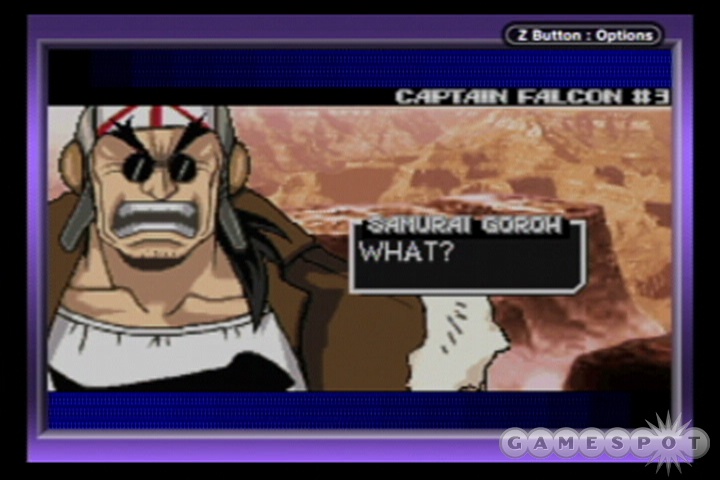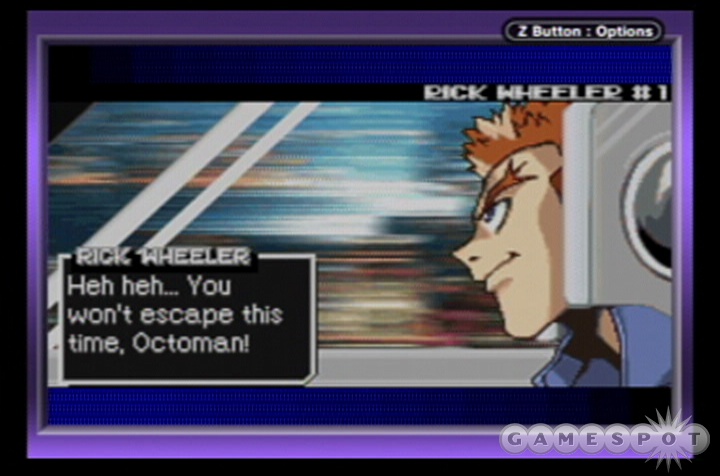F-Zero GP Legend marks the second time Nintendo's premier future-racing franchise has hovered over to the Game Boy Advance, the first being F-Zero: Maximum Velocity. Once again, Nintendo's 13-year-old formula hasn't received any major shake ups. The few graphical improvements that were made to Maximum Velocity from the original F-Zero have been reiterated here. You'll be treated to the same sort of MIDI, rock-and-roll soundtrack. Gameplay and hovercraft control remain unchanged. Fortunately, time has been kind to this old gameplay standard, and it is as much fun to play today as it ever was.

You still accelerate with A, brake with B, use the shoulder buttons to assist in making sharp turns, and use both shoulder buttons together for a speed boost. Using a boost depletes your health meter, as does crashing into the track boundaries. Although most tracks feature strips of hovercraft-healing green (which recharge this meter when raced upon), players must learn to budget their health, avoiding using so much for boosts that they go up in smoke upon hitting a wall. All of the game's included tracks are based on ones found in the original F-Zero. Fans will be delighted to once again race on the bustling trade planet Port Town or on the uninhabited Silence.
In fact, the only major difference between this game and previous entries in the series is that F-Zero GP Legend is based on the eponymous cartoon, which is now playing on Saturday mornings, and therefore features the same storylines and characters. As in the show on which it's based, GP Legend takes place in the year 2201, when F-Zero is the galactic sport of choice. In story mode, the game lets you play as one of several characters from the show, either you are affiliated with the noble Elite Mobile Task Force or you are in cahoots with the dark forces of the malevolent Black Shadow. The plot is told through hokey cutscenes that frame each race. These reveal, through poorly translated dialogue, the interconnected storylines of the racers, with Rick Wheeler and his 150-year-old battle with the evil Zoda at its center. F-Zero veterans needn't worry, though--Captain Falcon, with his Blue Falcon hovercraft, plays a significant role, and perhaps more importantly, this entry in the series has a great look with a solid sense of speed.
For each race you complete, your character will win a particular amount of prize money, depending on where you placed. Your goal for a race usually isn't to simply take the pole position. More often, you'll just have to place higher than a rival racer, who is most likely to nab third or fourth place. Beating the game with a racer will cue the credit scroll, and it takes about as much time as beating a fighting game. You'll unlock a new character each time you beat the game. Some of the campaigns are harder than others. For example, Zoda's missions require much more skilled play than Jody Summer's.
Outside of story mode, there's still a lot of gameplay to be had. In grand prix mode, you compete with as many as 29 other entrants for one of nine available award cups. Zero test mode gives you a series of challenges to complete in which you must race against the clock on short strips of each track. Training mode will get you up to speed, track by track. Finally, in time attack mode, you race to beat your own best times. These play modes combine to equal lasting gameplay for even the most skilled of racers.
As in F-Zero: Maximum Velocity, GP Legend lets you play multiplayer with either one cartridge or four. In the case of the former, track data is uploaded to connected GBAs, and this takes more time. Either way, F-Zero is as convincing a multiplayer experience as it ever was. You can double-tap a shoulder button to slam into your opponent, and this is especially fun to do to buddies. Like the best racers, F-Zero GP Legend rewards skilled play, and if you've been playing since 1991, you'll definitely have an advantage over newcomers.

Worthy of special mention is GP Legend's sound, which matches the intensity and pacing of the racing. Hard rock MIDI guitar riffs blend nicely with the rumbling of engines and clanks of colliding metal that are the basis of F-Zero's audio. The music that accompanies Legend's anime cutscenes nicely matches their affectation of an epic scope.
The fact that F-Zero holds up to modern gameplay standards is proof that it wasn't just liberal use of Mode-7 scaling that made the game revolutionary all those years ago. The classic has been nicely expanded here, with interesting story sequences that add a little more depth to an otherwise-straightforward racing game. It may be pretty similar to the last F-Zero for the GBA, but if you've yet to play a portable F-Zero, GP Legend can be recommended over its predecessor, as it features more modes and characters, and it is therefore a better value.